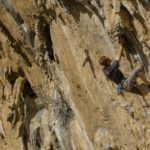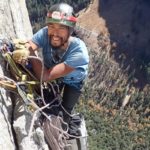It’s often in climbing that we want to progress, push past our perceived limits, and achieve something new. I am a fan of this, but I am not a big fan of how it goes most of the time. Commonly amongst climbers all you will hear about is the grade of the route they are trying,
how the V12 crux half way up my 5.15 project is just heinous, bro.
Yet the name of the route amongst the conversation gets lost and forgotten. Day after day, we go out and put our efforts into progressing and pushing ourselves to new levels, but do we really need to define our success by the number we are pushing, if we don’t fall, or if we onsight/flash it?

I believe it’s possible to push ourselves to greater heights and learn new things, while we may push our onsight level or number grade, but not define our success by those two common rules.
Dangers of an outcome-oriented mindset in climbing
As climbers, when we focus so much on “sending” our route and doing it properly by not falling and getting to the top, that we loose sight on so much more. By doing this we limit our learning, our awareness, and our opportunities. We get caught up in wanting to send the route so much that it begins to infiltrate our fragile minds. We obsess over the route, think about it constantly, dream about it and only want to send that route.
Related: How to Use Micro and Macro Beta to Project a Climb
Yes, at times this can actually help us send the route, but at the same time it tunnels our minds into an outcome-oriented mindset. When we get stuck in an outcome-oriented mindset, we begin to set in expectations; and when we set expectations that aren’t met, we tend to get upset, frustrated, down on ourselves, and be overtaken by unwanted thoughts and feelings.
This can be played out like this:
Climber Bill has climbed 100 5.10’s, and so he has an expectation that he can comfortably climb any 5.10 onsight. He begins to hold himself to this expectation on every 5.10 he does, when one day, Climber Bill falls on his 5.10 warm up and immediately gets upset and feels like he can’t climb well that day.
This is the problem with creating expectations for ourselves and routes. When they are not met we only find disappointments.
Another example of outcome-oriented thinking looks like this:
Climber Sarah has been projecting her V10 project for awhile now, getting closer and closer. Sarah has spent a lot of consecutive days only on the project and has felt great each time, and she is convinced that she can send it (which she probably can) but hasn’t sent yet. She begins to spiral downwards and lose progression in her attempts. This leads to her feeling frustrated, upset, and strange, questioning her own abilities.

Both Sarah and Bill in this example have put expectations on themselves that when unmet lead to them de-progressing in their climbing. This is where a shift of perspective can help. When we set our goals, but adopt a process-oriented mindset, we allow our minds and bodies to be open to possibilities and learning.
Benefits of a process-oriented mindset in climbing
When we utilize a process-oriented mindset we pay attention to more details in ourselves, our world, and our climbing. When we get caught up in our project and become frustrated, we can turn our mind to questioning like a detective:
Why did I fall? What made me fall? What could I have done better? How were my feet? How was I feeling? Did I forget to breathe?
When we shift our focus onto the process-oriented mindset we begin to question and learn. And when we learn, we expand our understanding of ourselves and our climbing, taking each climb as a lesson and a teacher. This is where we can redefine success.

Photo: Maria Ly
I think it was the famous Chris Sharma that said something like,
we should celebrate the small successes.
This is the exact point of the process-orientated mindset. When we can place our focus on learning—and a philosophy of wanting to learn—we gain small success in ourselves every time we climb. These small successes can be an abundance of things from better breathing, to reaching one hold higher than the last attempt, linking certain sections, having fun, feeling good on the climb, enjoying the process and learning something along the way.
Related: How to Breathe Properly: Breathing Techniques for Rock Climbing
This is where I want to see the climbing community move towards in their approach to climbing, in their definition of success. When we emphasize learning and expand our definition of success beyond just sending the route, we open our lives to more happiness, fun, and enjoyment.
I dare you today to set a goal for yourself that encourages you to live in the process-orientated mindset, to still have goals but to redefine the way you create success in your life. Whether it be in your climbing, your relationship, your work life, your home life, your school life, your networking, your love, I dare you to celebrate small successes, to smile, to approach life with a philosophy of learning.
Ultimately this will lead you to success in your bigger goals that coincide with the rules of the climbing game, but it will also take you there through a path of discovery. Take the risk, I dare you.

Photo: Laurel F.
Related: Why Every Rock Climber Should Meditate
Keep an eye out for more articles on engaging the mind and philosophy of rock climbing from Paul Roberts throughout the coming year.








